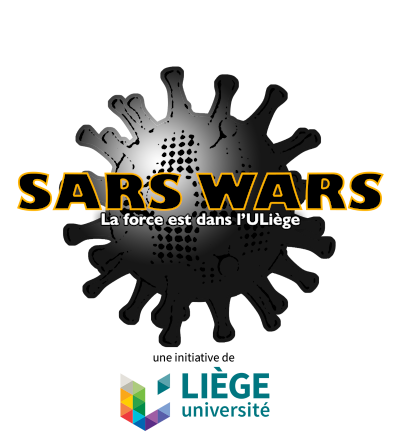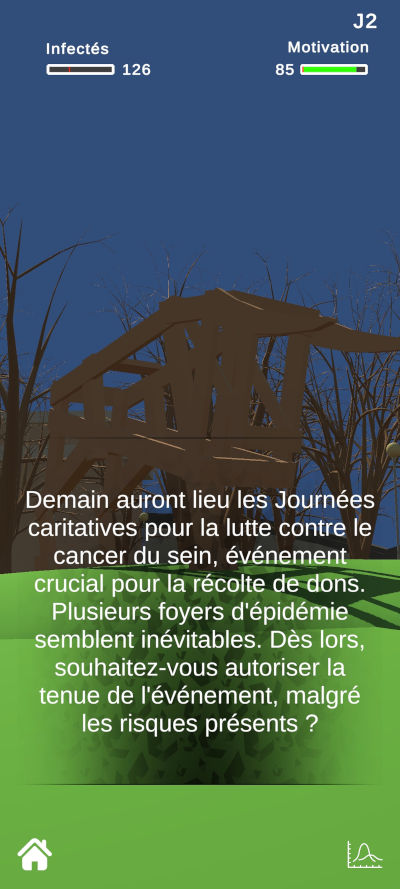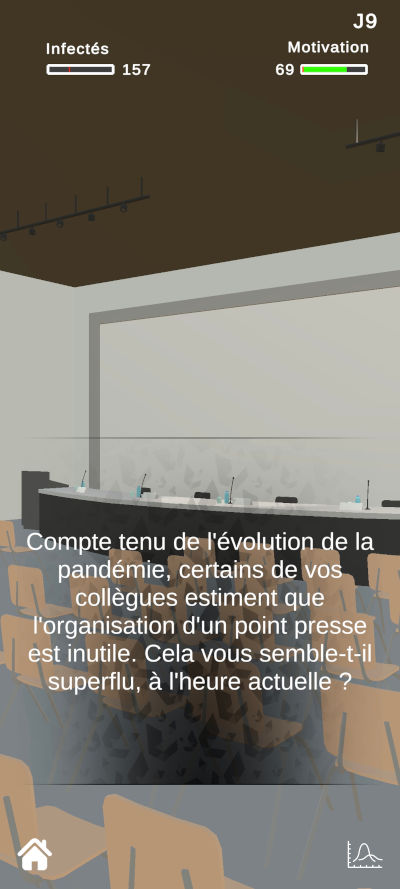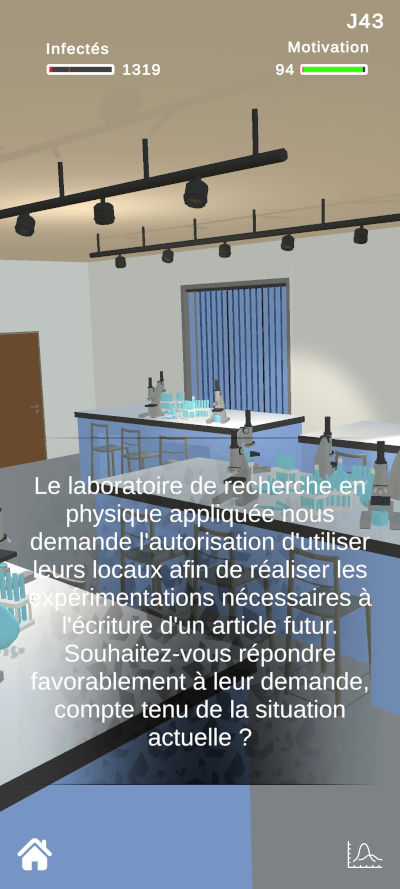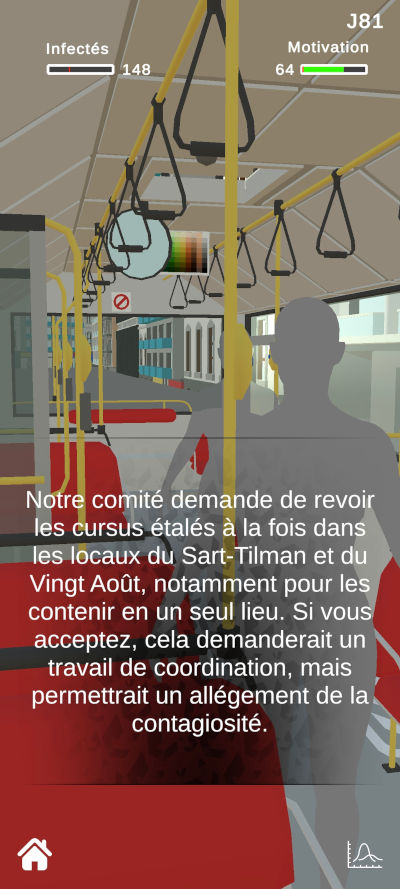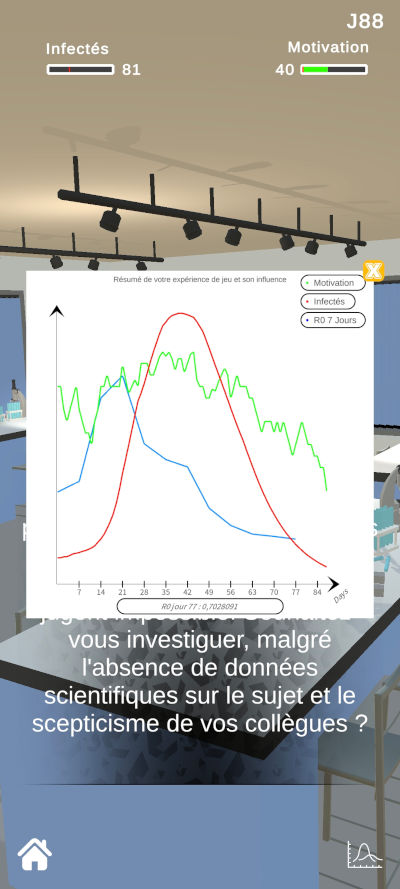Scientific method
Basic operations of the game
SARS WARS is composed of four decks of cards written in three elements: a basic situation requiring resolution, two resolution options (answer A or B) and multipliers associated with each option (a multiplier of the R0 and a multiplier of a motivational gauge). These four decks correspond to four stages of the pandemic: the initial phase (Deck a), the testing phase (Deck b), the vaccination phase (Deck c) and containment (Deck d).
To move from one deck to another, the player must be able to unlock access to it according to several game parameters. These accesses are materialized by special cards: alpha, beta, gamma, delta, epsilon, and theta. When the player stumbles upon these cards, he or she is offered the opportunity to move from one deck to another: alpha and beta unlock access to decks b and c; gamma, delta and epsilon return the player to containment (deck d); and theta allows the player to move out of containment (back from d to a, b or c depending on his or her previous position).
To achieve a win situation, the player must reduce the infection gauge (I) while maintaining a good relationship with the individuals in the population, as evidenced by their willingness to follow the measures (motivation gauge M).
The drafting of the cards includes: the application of proportionate or non-proportionate health measures; the organisation or cancellation of events, whether discrete or mass; the communication or not of the authorities on the evolution of the pandemic; the application or not of strict measures such as confinement, the banning of attendance at venues, etc. The development or not of complementary research; the arrival of new variants; dilemmas and other psychological or reasoning situations; questions of knowledge about the functioning of barrier gestures, the circulation of a virus or a vaccine; surprises; etc.

Credits: Liège Game Lab, 2021
Epidemiology model
SARS WARS is based on a compartmental epidemiological model. This type of mathematical model implies that a targeted sample (here, the academic population) can be divided into compartments according to its condition. The elements of the sample travel from one compartment to another in a specific direction. For the SARS-CoV2 pandemic, ULiège uses an augmented "SEIR" model (Van Hulle, 2021) which considers the salivary testing campaign implemented by ULiège, but also the application of two doses of vaccine (situation in force at the time) and the circulation of individuals with the outside world (compartments coloured red).

Schematic view of the two populations model
Publication originale : VAN HULLE, R. Two population epidemiological model. May 17, 2021.
This model, due to the large amount of data to be included in the algorithm that must manage the state of the pandemic in the game, has been simplified to build a trivial SEIR. The latter excludes too much backtracking from one compartment to another as soon as the vaccine is inoculated, reduced to one dose. Furthermore, the involvement of a compartment composed of individuals from outside the community (home, public transport, etc.) was reduced: the model operates in an almost hermetically sealed environment, where the individuals making up the population (25,000) circulate almost exclusively within the campus.
Once stripped of too complex data, the set contains the following parameters and indicators: max. of infections due to the external situation at the ULiège, automatically decreasing; time to cure/quarantine; loss of natural immunity; effectiveness of immunity; fraction of the population developing symptoms; return after false positive; time to develop symptoms; sensitivity and specificity of tests, frequency of screening; rate of participation in screening (from deck b); number of daily vaccinations (from deck c); and fraction of the population infected at the initial time.

VAN HULLE, R. JV — Modèle épidémiologique simplifié. July 2, 2021.
A multiplier of less than or greater than 1 is applied to the initial R0 for each response, depending on the situation faced by the player. These multipliers range from x 0.75 to x 1.2 (within limits considered "reasonable" or scientifically plausible). The higher the multiplier, the higher the R0 and the higher the infections (infection gauge = I). Conversely, a multiplier lower than 1 will reduce the R0, which in the long run and depending on the evolution of the R0, may decrease the infection curve.
 Motivational perspective
Motivational perspective
In contrast to the epidemiological model, which predicts the evolution of the pandemic based on the actions of the player, it is impossible to create a complex motivational algorithm with the same ambitions. This is because the workings of social psychology and health psychology are fundamentally different, not least because of a multitude of constantly changing factors.
To simplify the logical reasoning of the player and the construction of the gameplay of SARS WARS, it was decided that the motivation would be materialized in the writing of the questions asked to the player. From then on, the writing was done according to several markers, representing several complementary or even related disciplines or research objects.
On the one hand, the inspiration of an initial modelling based on interactions between individuals makes it possible to treat human behaviour under the prism of social components. By referring to social psychology, the game addresses issues such as reticular interactions, socio-professional profile, social pressure or proxemics. On the other hand, the inspiration of micro research, close to health sciences, questions the player as an actor of the pandemic by addressing personal dimensions: causal attributions; belief systems; motivation and sensitivity; severity, vulnerability, and threat; or cost/benefit ratio.
Mechanically, each response A or B proposed to the player performs a mathematical operation of the type of addition or subtraction to a gauge (motivation = M) whose maximum value is 100. Depending on the initial situation, the deck membership (deck d relating to containment) or the nature of the responses, a subtraction or addition of a value of 5 or 10 is performed. In addition, some situations have no impact on the gauge.
 In short
In short
The individuals (25,000) of a given population (the ULiège academic community, including administrative, technical, and working staff, professors and researchers, students and rectoral authorities) circulate from one compartment to another according to their state (uninfected, asymptomatic, recovered, vaccinated, false positive, true positive and symptomatic). This circulation is achieved according to the player's choices, which apply a multiplier to a naturally high R0 (basic reproduction rate of a virus) at the beginning of the game, as well as an addition or subtraction to a gauge specific to the population's motivation.
The player navigates from deck to deck (a, b, c and d) according to choices made during the game (launch the testing? develop the vaccine? confine?). With each card:
- the player makes a decision;
- the player's decision applies a multiplier greater (from 1.05 to 1.2) or less (from 0.7 to 0.95) than 1 to the R0;
- the R0, after applying the multiplier, causes the Infected gauge (I) to increase or decrease;
- the player's decision also applies an addition or subtraction (between -10, -5, +0, +5 and +10) to the motivational gauge (out of 100);
- with each decision, individuals from the population migrate from one compartment to another, with vaccination removing individuals from the model.
Limitations
Despite the rigour of the methodologies used to make SARS WARS a game inspired by concrete, theorised and observed dynamics, any video game remains an allegorical construction: the video game medium, while it can call upon relevant scientific reflections, is formed around a central playful dimension. The construction of the gameplay is essential to its functioning, and many elementary scientific reflections have been abandoned, or put aside, to avoid any conflict with the game's ludic identity (strategy, card games, mobile time, etc.).
In other words, and given its playful nature, SARS WARS cannot be a fully-fledged research tool or mathematical simulation that can be mobilised for specific studies as is. On the contrary, a tool like this requires contextualisation, support, and the production of a discourse. Therefore, the results of the game, although the product of a scientific method, cannot be considered as faithful to reality.
